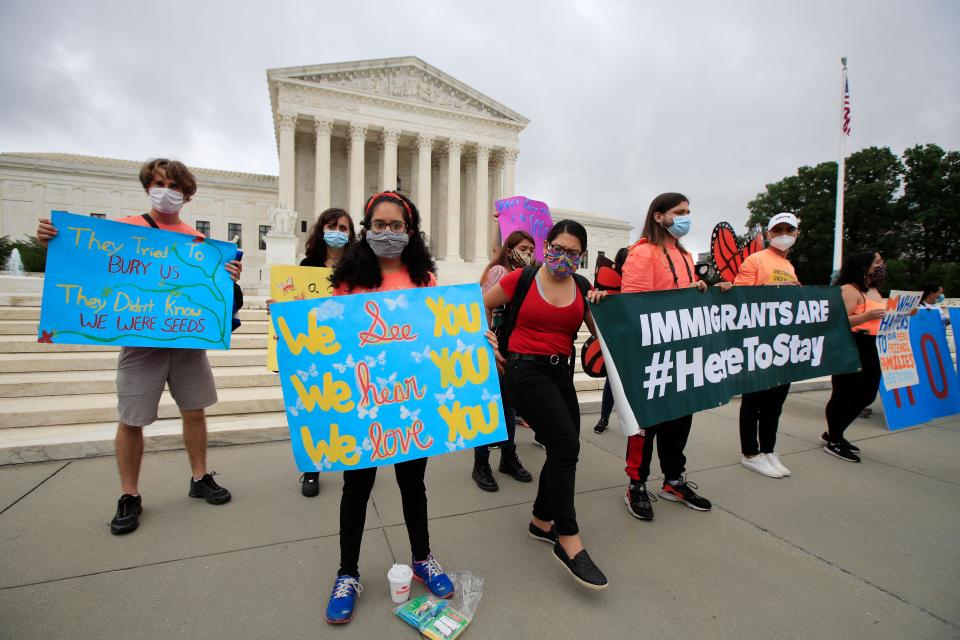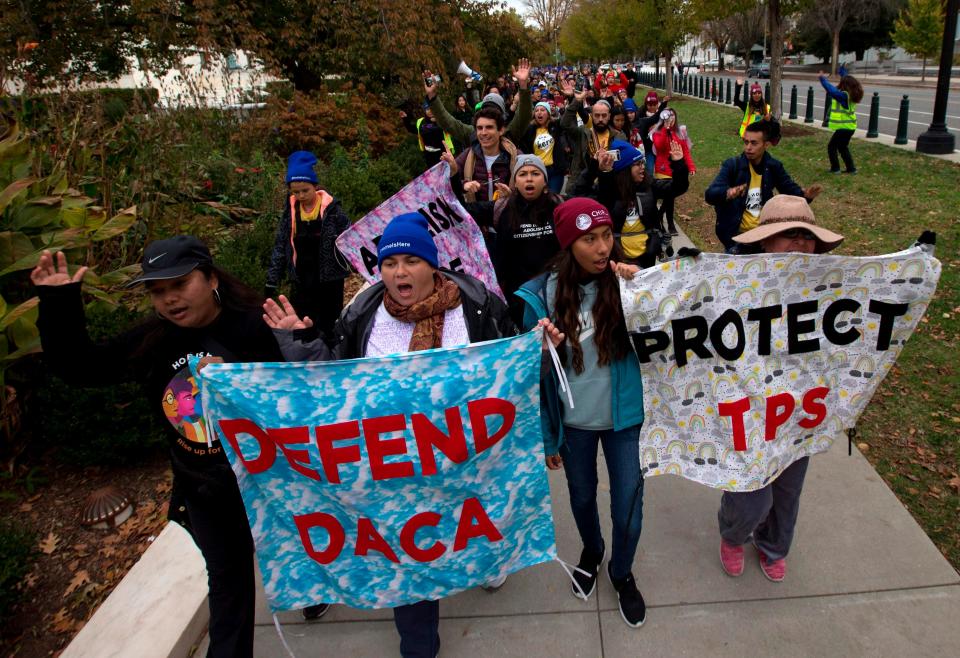As DACA turns 10, businesses urge Congress for permanent status for children of migrants
Most people won't be able to pick Amalia Rojas out of a New York City crowd: Young, educated, aspiring playwright, fluent English speaker.
But Rojas is one of thousands of immigrant children brought to the United States at a young age who took advantage of the Deferred Action for Childhood Arrivals, or DACA, an Obama administration-era program that protects immigrant children from deportation.
Though she doesn't have permanent legal immigration status in the United States, she's a working, contributing, thriving New Yorker.
"DACA recipients are the person you see driving their car next to you," said Rojas, 29, a program manager at a non-profit in New York. "They are the cashiers at the restaurant or the customer paying the cashier. Just like other immigrants, their story deserves to be told."

For years, immigrant advocates have heralded DACA recipients' stories. Now, some of the nation's top businesses are also throwing their support behind them.
On Wednesday – the 10-year anniversary of DACA’s creation – IBM, Uber, Apple, Microsoft and 43 other corporations and business associations dispatched a letter to Congress, calling on lawmakers to agree on a bipartisan permanent solution for Dreamers, the estimated 1.9 million sons and daughters of immigrants who were brought to the United States at a young age.
"As employers and business associations committed to a strong U.S. economy, we highly value the contributions of Dreamers in our workforces and communities and reiterate the urgent need to provide them with long-term certainty and stability in the only country they know as 'home,'" the letter said.
A separate group of business leaders this week is also meeting with U.S. senators' offices to push for favorable legislation for DACA recipients, said Dan Gordon, a vice president with the National Immigration Forum, an immigrant advocacy group based in Washington, D.C.
"The business community has been very strong in their support of DACA recipients and Dreamers," he said. "Businesses realize that they count on these workers and just how much they contribute."
The DACA program was created in 2012 by the administration of then-President Barack Obama as a temporary way to protect thousands of children of immigrants who were brought to this country as minors. To qualify, immigrants had to have come to the United States before turning 16 and never been convicted of a felony, among other requirements. The status, which needs to be renewed every two years, protects recipients from being deported and allows them to legally work in the United States.

In 2017, President Donald Trump ordered the end of DACA but court rulings upheld the program, including a 2020 favorable decision by the U.S. Supreme Court. After taking office last year, Biden directed Homeland Security to preserve and fortify the program, though other lawsuits still threaten it.
Today, there are about 645,000 DACA recipients with an average age of 27. Around 1.9 million children of immigrants are considered "Dreamers," those brought to this country as minors, though not all qualify under DACA.
The fact that the courts have had to repeatedly rescue DACA -- and may dissolve it -- underscores Congress' inability or unwillingness to give more permanent status to children brought to this country as minors, said Theresa Cardinal Brown, managing director of immigration and cross-border policy at the Washington-based Bipartisan Policy Center.
Also, as the population that qualifies under the program ages out and new migrant youths arrive, there will be less protection for new arrivals, she said. Only a more permanent legislative fix could offer long-term relief.
"Fifteen years later, the problem that was supposed to be addressed by this program has only grown," Brown said. "It's a failure of Congress."
Businesses such as those who signed Wednesday's letters are taking notice because many of the DACA recipients have been raised in American schools, speak fluent English and have joined the workforce en masse, said Jessica Orozco Guttlein, chief of staff at the Hispanic Federation, a nonprofit Latino advocacy group.
A 2019 study by the New American Economy, a research fund, showed that the DACA-eligible population earned $23.4 billion in 2017, up from almost $19.9 billion in 2015. Another analysis in 2020 by the Center for American Progress, a nonpartisan policy institute, showed that DACA recipients and their households pay $5.6 billion in federal taxes and $3.1 billion in state and local taxes each year.
"Businesses are smart to know this population is incredibly important," Guttlein said. "They're incredibly important to corporate America as well."
Rojas was raised in New York City public schools. She said she wasn't aware of her immigration status until after she graduated high school and was accepted to the University of California, Los Angeles and began filling out enrollment papers. Her parents told her she was actually born just outside Mexico City and brought to New York when she was four months old.
Her status prevented her from getting financial aid but she worked odd jobs -- such as helping her mother clean apartments and waiting tables -- and earned a bachelor's degree in political science from Lehman College at the City University of New York. DACA has allowed her to gain better-paying jobs that helped push her through her final years at college, she said.
Today, Rojas is pursuing a master's in fine arts from Columbia University and is a fledgling playwright. Her first play, "How to Melt Ice," will be produced in New York next spring. It's about a girl who's brought to the United States at a young age and falls in love with an agent from Immigration and Customs Enforcement, or ICE, the agency tasked with persecuting undocumented immigrants living in the country.
DACA has been a life-saver, she said. But a more permanent solution is needed.
"It's not sufficient," Rojas said. "This program keeps getting attacked. When do we stop the attacking and actually have lawmakers make a change?"
Follow Jervis on Twitter: @MrRJervis.
This article originally appeared on USA TODAY: Young immigrants deserve to stay in US, business leaders tell Congress

